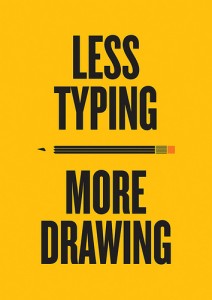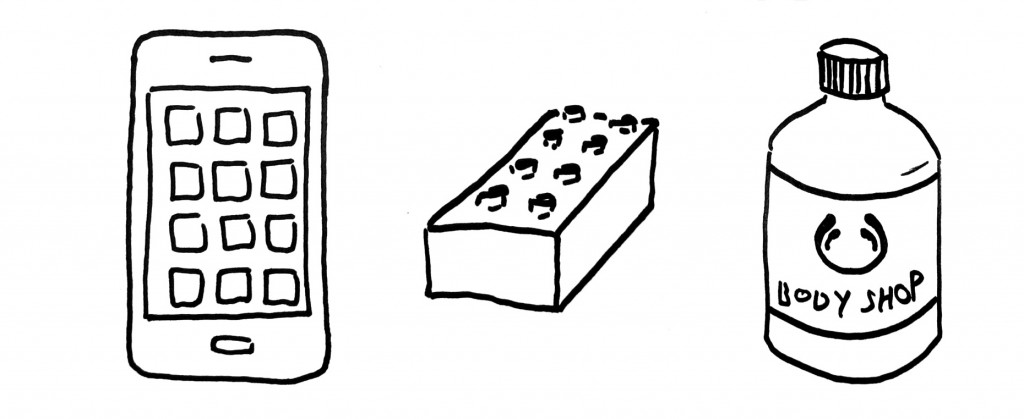Creative work
My work is creative work, and yet it often feels like bureaucratic work. I’m sitting in front of a computer, typing. To someone peering through the window, watching me, I might look like an accountant (no offence to accountants). I believe a lot of people think the same way about their work, and they’d like it to be different. What can we do about it?
I’m poking at this problem, and I wanted to put down a few initial thoughts, some stuff that may help inform a solution.
Can language suppress creativity?
WNYC’s excellent Radiolab podcast this week told the story of Anne Adams, a biologist-turned-painter who suffered from an (ultimately fatal) brain disease called primary progressive aphasia:
… she decided to quit science altogether and become a full-time artist. After that, her husband Robert Adams tells us, she just painted and painted and painted. First houses and buildings, then a series of paintings involving strawberries, and then … “Bolero.”
At some point, Anne became obsessed with Maurice Ravel’s famous composition and decided to put an elaborate visual rendition of the song to canvas. She called it “Unraveling Bolero.” But at the time, she had no idea that both she and Ravel would themselves unravel shortly after their experiences with this odd piece of music.
The radiolab site links to more detail on the condition itself.
[In a patient with primary progressive aphasia] structural and functional enhancements in non-dominant posterior neocortex may give rise to specific forms of visual creativity that can be liberated by dominant inferior frontal cortex injury.
[…]
Paintings from AA’s artistic peak revealed her capacity to create expressive transmodal art, such as renderings of music in paint, which may have reflected an increased subjective relatedness among internal perceptual and conceptual images.
Anne’s story is beautiful and tragic, and I hesitate to make a link between her experience, and my own experiments in creativity. That being said, I did find the idea fascinating that, as Anne’s language capabilities lessened, her visual, creative abilities flourished. As if the weight of language had been taken off her, allowing her mind to be more free – at least for some time.
When I engage in intensively language-based analytical tasks – writing emails or proposals – is the use of language itself suppressing other parts of my brain? Should I look for other tools to communicate, or work out problems, in order to reduce my reliance on verbal tools?
Bureaucracy in the arts world
 I’ve been following the work of Natalia Buckley and James Bridle in their Happenstance residency at Lighthouse. At a talk there on Tuesday, James mentioned that when he arrived, he was surprised at how much the Lighthouse office – that of an arts organisation – looks like any other office. People sitting front of computers, typing.
I’ve been following the work of Natalia Buckley and James Bridle in their Happenstance residency at Lighthouse. At a talk there on Tuesday, James mentioned that when he arrived, he was surprised at how much the Lighthouse office – that of an arts organisation – looks like any other office. People sitting front of computers, typing.
I don’t think there was necessarily any value judgement in that comment, though they have made interventions as part of their residency, in an attempt play with Lighthouse’s working practices.
What I found most valuable from their talk was the idea of making interventions – introducing disruptions or new techniques into my working practice to disrupt bad habits, and introduce some new creative energy.
Coincidentally, today, I stumbled on this blog post by Ben Terrett, in which he talks about a similar kind of frustration. And to be clear – if you read that blog post – I am also talking about the email kind of typing, not the coding type.
Sketching
On Wednesday, I gave a talk about innovation at Nixon McInnes. As an experiment, I tried to draw as many of my slides as possible, just using a pen and paper. No bullet point lists, no witty photos with pithy captions. Just simple drawings.
Partly as an experiment in communication – would people understand them, would they stimulate me to make all the points I wanted to make as I talked to them? But also so I could think through the subject matter as I was absorbed in the act of sketching.

The impetus for this experiment came from Sunni Brown’s TED talk, Doodlers, unite! She says:
So here’s a new definition for doodling. … Doodling is really to make spontaneous marks to help yourself think. … People who doodle when they’re exposed to verbal information retain more of that information than their non-doodling counterparts. We think doodling is something you do when you lose focus, but in reality, it is a preemptive measure to stop you from losing focus. Additionally, it has a profound effect on creative problem-solving and deep information processing.
Other interventions
So making opportunities to close the laptop and pull out a pen is one possible intervention. A ‘no-email’ day is another. What are others?
And while an over-reliance on analytical thinking and language may be one part of the problem of bureaucratic work, I don’t believe that’s all there is to it? What other practices make us behave like office workers when we’re free to do otherwise?